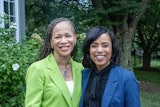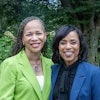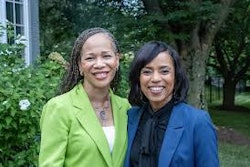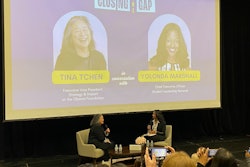 Dr. Jacinta Saffold
Dr. Jacinta Saffold
Founded in 2018 with the recognition that Black women’s perspectives have long been marginalized in academia, BWSA was birthed as a necessary space for scholars dedicated to studying Black women’s histories, politics, literature, and lived experiences. Unlike traditional academic organizations that can be exclusive or rigid in their scope, BWSA is intentionally inclusive, embracing interdisciplinary and multidisciplinary approaches to the field of Black Women’s Studies.
When co-founder and treasurer Dr. Jacinta Saffold and the organization’s president, Dr. Nneka Dennie enrolled at the W.E.B. Du Bois Department of Afro American Studies at the University of Massachusetts Amherst as doctoral students, they saw similarities in their research but began experiencing challenges within existing organizations aimed at supporting their work.
“It was difficult for us to collaborate, present together, and align our thought processes at first, but we recognized the value in working together,” said Saffold, who is currently an assistant professor of African American literature at the University of Delaware. “In graduate school, we began exchanging documents for awards, fellowships, grants, and other opportunities and we realized that while our research was separate, it was also complementary, allowing us to strengthen each other’s applications. We kept saying there should be an organization that highlights how our work connects rather than divides. That’s how this all began.”
Today, the BWSA has grown from a small initiative into a thriving digital community. Saffold remembers the first time the group received recognition for their work.
“The first time that I saw the Black Women's Studies Association acknowledged in someone's first monograph, I cried. I just cried,” she said.
The organization started with initiatives like "Word Count Wednesday," a virtual writing space for scholars centering on Black women, and "28 Days of Black Women's Studies" during Black History Month, which is now in its fourth year and expanding into Women's History Month.
 Prilly Bicknell-Hersco
Prilly Bicknell-Hersco
“It was very difficult to navigate what the association would look like and how we would govern ourselves, given that we founded it virtually at that time,” Saffold said. “The pandemic really forced us to adopt an identity of a completely digital association. Everything that we have done has been virtual, and I think that's one of the strengths of our organization. It allows us to be reflexive and responsive to the needs of our members.”
From the start, BWSA sought collaboration rather than competition. Before launching, they reached out to organizations like the Association of Black Women Historians, the National Women's Studies Association, and the National Council of Black Studies to introduce themselves and invite partnerships. That commitment to community-building is central to their ethos.
After years of building, the organization is excited to bring scholars together to celebrate, collaborate, and expand their work centering Black women in academia. The group will host its second annual convening from April 4-5 titled “No One is Free Until We All are Free:” Activism, Advocacy, and Academic Freedom During Late-Stage Capitalism.” The symposium will include a keynote delivered by Dr. Ashley D. Farmer, a prominent historian at the University of Texas at Austin. Other panel discussions will include a variety of other sessions, including a plenary called “Lifting the Veil: What They Don't Tell Us about Publishing," that includes Diverse executive editor and Trinity Washington University professor and associate dean, Dr. Jamal Watson.
The BWSA sees the upcoming symposium as a crucial space for discussions on late-stage capitalism, freedom, justice, and equity.
"How can we reclaim the power of science and scholarship at a time when so many of our purported leaders are trying to upend and undermine that?" said Dr. Jessica Samuel, BWSA Conference Chair and the founder & CEO of Radical Education & Advocacy League, LLC. She added that the symposium is positioned as a necessary space for those invested in the state of society, humanity, and collective relationships.
"You should come to this conference. You should make it your mission to participate, to be an attendee, to be in attendance and, where applicable, become a member," she urged, highlighting the event's significance for anyone concerned about the future.
The symposium aims to explore how economic systems shape understandings of self-determination, democracy, and intersectional struggles, especially in the face of what Samuel calls an ongoing global crisis.
"Right now, we're in a moment where we are seeing how unhinged capitalism, is truly a threat to our understanding of self-determination and freedom,” she said. “This event will emphasize the importance of adopting a Black feminist perspective to examine broader societal issues,” Samuel added.
Referencing Malcolm X’s famous statement that "the most disrespected person in America is a Black woman," she highlighted how centering Black women’s voices can lead to a deeper understanding of structural inequalities.
“When you listen to Black women, you really open up avenues to understand and listen to other people, especially because of how our hierarchical systems of caste and race and all of these other isms are structured in such a way that keep Black women at the very bottom, and Black femme and trans people even further down,” Samuel added.
Subthemes of the convening will include the history of Black feminist movements, the impact of surveillance, challenges in organizing Black Women's Studies, coalition-building, and self-advocacy. The event will also address the urgency of self-care amid persistent social and political threats.
"What does it look like to build solidarity and sustain it, despite all of the nonsense that we are experiencing relentlessly?" asked Samuel.
Membership chair and doctoral candidate in the Faculty of Education at York University, Canada, Prilly Bicknell-Hersco told Diverse that the special plenary session she curated as part of the symposium is unique in nature and will include five experts in the field of publishing both in and beyond academia.
“I think it’s difficult for many early year scholars and graduate students to navigate the process of publishing, especially as a Black woman, so this is going to be very special for our members,” said Bicknell-Hersco.
As the membership chair, she is excited about strengthening BWSA’s network of Black women and expanding its presence in her own community—Toronto, Canada. She aims to broaden its reach by incorporating in-person activities to foster deeper engagement among members.
Samuel said that she takes pride in the organization’s future.
"Every person on our board is a Black woman or femme, and there’s something deeply empowering about creating space for ourselves within the community," Samuel said. "We are drawing on the principles of the Combahee River Collective, a group of Black women who responded to a time of crisis and violence by coming together to create a safe haven for those who looked like them. I see the BWSA as literally living and existing in the direct lineage of that kind of history.”















